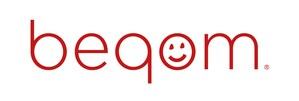Progress, Setbacks, and Navigating the Unknown: beqom's 2024 Pay Equity Report Benchmarks Employer Efforts in Closing Wage Gaps
- One-third (34%) of companies do not have a pay equity strategy in place
- 3 in 4 (70%) have conducted a pay equity analysis and uncovered wage disparities
- Just 2 in 5 are aware of global pay equity standards
NYON, Switzerland, June 27, 2024 /PRNewswire/ -- As companies globally face mounting pressure to achieve pay equity, both to comply with new laws and attract and retain the best talent, closing the pay gap has become an urgent priority.
Yet, at a time when fairness and equity are central to business priorities, one in three (34%) companies today still do not have a pay equity strategy in place, and over half (54%) doubt their company complies with global standards. Nearly half (45%) admit that their approach to pay equity is hurting their ability to attract talent.
That's according to data from beqom's 2024 Pay Equity Report that surveyed 875 salary and compensation decision-makers across the U.S. and U.K. to compare how companies are approaching pay equity.
"Our survey shows employers grapple with addressing wage discrepancies and promoting fair compensation. They understand the urgency in confronting wage gaps but find themselves navigating a complex web of regulatory requirements and stakeholder demands," said Tanya Jansen, co-founder and CMO, beqom. "However, there is clear evidence of progress and enthusiasm around integrating pay equity into compensation strategies – employers just need help. They need more guidance to understand pay equity standards and how to correctly implement compensation strategies that minimize compliance risk."
Findings show employers struggle with compliance complexities, particularly at the global level with just 2 in 5 (41%) employers claiming they are aware of global pay equity standards.
Despite their struggle to navigate compliance standards, employers have made encouraging progress toward understanding pay equity gaps and taking action. Nearly three-quarters (70%) of employers say they have analyzed their compensation strategies and shared existing gender pay gap statistics with employees and/or external stakeholders.
However, strategies for dealing with pay equity and transparency are mixed. While most employers are at least looking at pay equity, at the same time they are discovering underlying problems. Three in four companies (70%) have even conducted a pay equity analysis that uncovered wage discrimination (64%), promotion disparities (57%), below-market salary ranges (54%), pay compression (53%), gender pay gaps (48%) and more.
In response to these findings, companies are taking positive steps to close existing gaps and foster transparency, including:
- Listing salary ranges within new job descriptions (81%)
- Increasing salaries due to inflation and economic standard of living costs (68%)
- Implementing a process for continuous feedback (67%)
- Increasing pay to correct existing pay gaps and salary inconsistencies (65%)
- Providing clear structure for bonuses and performance review processes (65%)
- Increasing salaries based on performance (65%)
- Implementing company-wide performance review processes (62%)
- Offering more resources to help employees better understand their total compensation (61%)
- Making executive pay visible/public knowledge (47%)
- Disclosing the pay ratio for executive officers and median employees (29%)
"Employers are making meaningful progress and taking action. However, it's clear some of these well-intended actions need to be re-examined as nearly half (45%) of employers say their approach to pay equity is hurting their ability to attract talent," said Jansen. "Pay equity is a complex problem that HR leaders often bear the brunt of addressing, but it cannot be solved without the help of technology. We want to help employers by providing a solution that embeds pay equity into decision-making across the organization and simplifies the process of addressing pay equity issues in a sustainable and compliant way. We have an opportunity to support fair pay practices across the globe and we remain committed to helping employers create innovative compensation strategies that are built for the future."
To read the complete report visit, [https://hubs.li/Q02CNc5K0]. For more information about beqom, visit www.beqom.com.
Methodology
The survey was conducted by beqom in February and March 2024. The goal was to comprehensively examine pay equity through an online survey directed to salary and compensation decision-makers across the U.S. and U.K. The results reflect answers from 875 total respondents (U.S. = 597, U.K. = 278) working in the Automotive, Finance & Insurance, Healthcare, Hospitality/Food & Beverage, Retail, and Technology industries.
About beqom
beqom is a purpose-built compensation platform that intuitively gives employers the power to realize comp's full potential from end to end, every day. We help the world's leading enterprises leverage their talent through complete, equitable, and transparent performance and rewards.
With unified data, complete pay management solutions, and AI-enabled pay intelligence, beqom enables companies to comply with regulatory requirements, optimize compensation decisions, and achieve better business results.
MEDIA CONTACT
SHIFT Beqom, [email protected]
Beqom
SOURCE beqom

WANT YOUR COMPANY'S NEWS FEATURED ON PRNEWSWIRE.COM?
Newsrooms &
Influencers
Digital Media
Outlets
Journalists
Opted In




Share this article